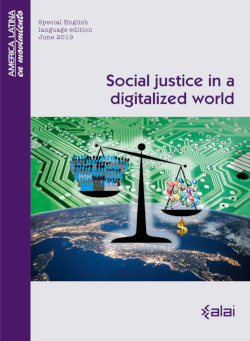Digital public services
When digital governance is designed by and for multinational corporations, it amplifies the rate of corporatisation and privatisation of public services and increases precarious work.
- Opinión

| Article published in ALAI’s magazine No. 542: Social justice in a digitalized world 24/06/2019 |
Digital technologies are re-shaping the nature and experience of labour, public services and the very nature of the state and a functioning democracy. Digitalisation and the collation of large amounts of data, can enhance the design and delivery of public services, increase occupational health and safety, reduce working hours and provide for greater democratic participation and accountability. Yet, when digital governance is designed by and for multinational corporations, it amplifies the rate of corporatisation and privatisation of public services and increases precarious work.
The global labour movement has made repeated efforts to address the impact of digitalisation in diminishing labour rights, violating the privacy rights of workers and particularly driving precarious work. Automation and artificial intelligence are projected to fundamentally re-shape and replace some areas of work. The conditions of workers in the ‘platform economy’ or the ‘uberisation of work’ requires a fundamental re-think about how we govern employment and protect workers outside of traditional workplaces. The ILO’s ‘future of work’ centenary initiatives address some of these threats. But to understand digital threats to workers and public services we need to address the political economy of digitalisation and question who should own, who should profit from and who should benefit from technological advances, including the aggregation of peoples’ data.
Data is clearly a resource that has value. That value can be monetised and generate unprecedented profits. The value could also be seen as a public resource – a resource that is needed for governments to provide quality public services. The public has generated the data and should have a right to have that data used for common good. It is now commonly recognised that data is the most profitable resource in a digitised economy – the ‘new oil’. Corporations increasingly offer platforms or infrastructure as a means of collecting lucrative data. Tesla, for example, is valued not as a car manufacturer, but as a platform for data collection.
Governments gather a large amount of data critical for effective governance, planning and the delivery of public services. Data is critical in all government policy making and includes environmental data critical for climate, agriculture and public health planning, public registries, data on private sector compliance and tax, transport, education, the use and distribution of utilities, to individual data potentially including health, work, wealth and income, education, family life.
But it’s clear that digital corporations have plans to increase profits through the delivery of public services. Samsung, for example, projects that a significant amount of future growth will come through health related applications, like digital diagnostics. Public transport tickets in several cities can now be paid for through Google Pay that then offers a digital ticket, leaving a large amount of transport data with the company. An application in Australia designed to assist the public to book an appointment with a doctor was found to be selling information to plaintiff law firms enabling them to contact users to lodge compensation claims.
Digitally induced privatisation of public services takes place through varying paths: the outsourcing of key public service functions using the false premise that the public sector lacks the expertise; public-private partnerships with the private sector, where the private sector retains the intellectual property produced and often retains access to collected data; private sector using technologies to financialise public services like health, education, utilities, transport as well as public records and data. Private sector partnerships in the delivery of digitalised public welfare services are problematic because they shift the relationship of citizens with their democratic institutions to a relationship of client. At the same time, those private sector products and profits have been dependent on public funding. Researcher Mariana Mazzucato has famously shown that every major technological advance, from life-saving pharmaceuticals to the I-phone, has been dependent on public research or funded by public grants.
‘Smart’ cities?
The enthusiasm for ‘Smart Cities’ – cities that engage sensors, big data and automation to manage traffic, parking and public transport, frame planning decisions, increase policing and security, deliver services and automate administrative decisions, including those relating to welfare payments and services –, promises less traffic congestion, better public transport and more targeted and efficient public services. However, the propensity to develop smart cities through partnerships with the private sector generates risks of displacing public sector workers, gifting large amounts of community data to for-profit corporations, shifting urban design toward profit and efficiency motives, producing perverse automated administrative decisions and effectively privatising public services and public spaces.
Bill Gates has bought up land to build a smart city the size of Paris.[1] The City of Toronto has formed a development corporation to develop the former docklands in Toronto in partnership with Alphabet (Google). The Indian Government have set an aim of developing 100 Smart Cities. The city of Gurgaon, one of the newest cities in India, serves as a harbinger of the future of cities built by tech companies. The city was built on the outskirts of Delhi to house the growing number of multinational tech companies seeking a presence in India. Google, Nokia, Intel are all present. The city was built by the companies based there. All services, including emergency services, street repairs, water, energy have been developed by corporations. Residents have apps to improve security, garbage trucks have sensors, the privately run fire service claims to have the most advanced trucks in India. Yet while Gurgaon boasts state-of-the-art buildings and houses, some of the country’s wealthiest, residents who live in its many slums have no access to water, mountains of uncleared garbage and their roads are full of potholes. There is no sewage system in Gurgaon, “so private companies collect the sewage in septic tanks and dump it in nearby rivers or on open land. Privately drilled borewells have quickly depleted the amount of groundwater in the city”.[2]
Big data companies are not just providing contracted services, they are designing cities that will generate greater profits for them and greater opportunities to extract valuable data. Will residents of the Gates city be required to use Microsoft products to operate their services? Will deliveries in Toronto depend on Google driverless cars? Will the extensive data collected in these cities be used to build public services or will it be used to generate further profits and sit in tax havens?
Data as a public good
Outsourcing the development of digital technologies to the private sector diminishes opportunities for the public sector to grow expertise further, develop innovations that have the greatest public good and stimulate digital industrialisation. Outsourcing and partnerships also pose risks to the quality of public services. Outsourcing of digitised visa processing in the UK left applicants at risk of deportation; outsourcing the digital census process in Australia to IBM was an unmitigated disaster, with the system failing within minutes of launching and concerns that the public’s data would be easily hacked.[3]
Given the vast amount of profits projected, it is no surprise that techno capitalists seek to ensure that data flows are unregulated and able to be commercialised. Through trade agreements, and potentially through the World Trade Organisation, governments are surrendering the capacity to effectively manage data flows in ways that will enhance the public good. The e-commerce chapter of the erroneously titled Comprehensive and Progressive Trans Pacific Partnership Agreement (TPP), effectively prohibits governments from protecting data as a common resource. The agreement requires governments to protect free flow of data, prohibits data localisation laws and any requirement for digital corporations to register a local presence in the countries in which they operate.
The public benefits that digitalisation can deliver will only be realised if data is recognised as a commonly owned public good and accompanied by the regulations and institutional public bodies that public goods require. There is an urgent need to develop the public institutions and infrastructure required to enable data for the public good, to deliver a data commons capable of not just regulating big data but of delivering data as a public commons designed to support better public services, support more effective regulation of the private sector, provide government revenue and give the public control over the use of their data.
If the economies of the future are going to provide decent work, universal social protection and quality public services, unions and civil society will need to use our collective power and democratic agency to:
- Stop the privatisation of public services by digital corporations
- Stop trade agreements and trade rules that guarantee deregulation of data and prevent governments from developing digital industrialisation policies
- Ensure governments develop policies and institutions to recognise, administer and regulate data as a common good
- Develop new global rules for corporate structures and taxation that prevents digital companies from hiding profits in tax havens.
History shows us that when technologies are in the hands of the private sector, productivity gains end up as increased profits unless strong unions ensure a regulatory environment that distributes the gains to all. It is imperative that trade unions and civil society advocates understand the impact of digitalisation on workers, on organising, on the economy, on security, on our right to quality public services, and on the capacity of governments to govern.
Kate Lappin is the Asia Pacific Regional Secretary of Public Services International, the Global Union Federation representing more than 20 million workers delivering public services worldwide.
A version of this paper was presented at the global workshop on Equity and social justice in a digital world, organised by the Just Net Coalition.
Del mismo autor
- Digital public services 15/07/2019
- Servicios públicos digitales 11/07/2019
Clasificado en
Comunicación
- Jorge Majfud 29/03/2022
- Sergio Ferrari 21/03/2022
- Sergio Ferrari 21/03/2022
- Vijay Prashad 03/03/2022
- Anish R M 02/02/2022
Internet ciudadana
- Nick Bernards 31/03/2022
- Paola Ricaurte 10/03/2022
- Burcu Kilic 03/03/2022
- Shreeja Sen 25/02/2022
- Internet Ciudadana 16/02/2022









